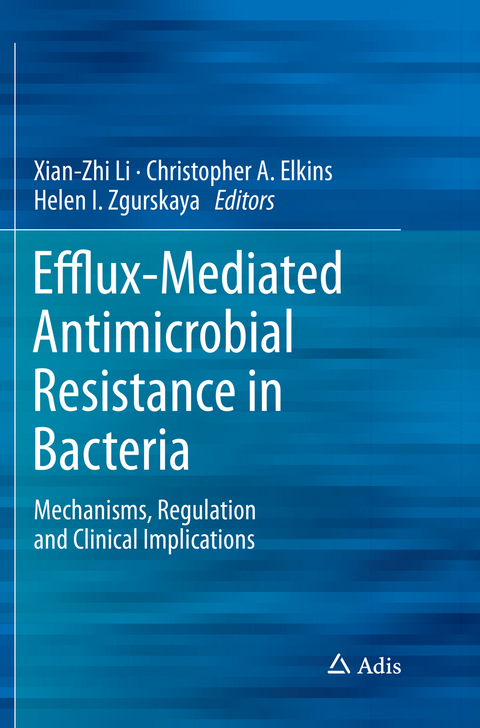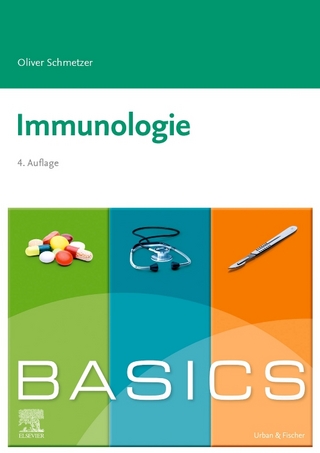
Efflux-Mediated Antimicrobial Resistance in Bacteria
Springer International Publishing (Verlag)
978-3-319-81934-1 (ISBN)
This book, written by leading international experts, provides a comprehensive, current examination of transport-mediated antimicrobial resistance. As a particularly powerful mechanism of multidrug resistance, an in-depth examination of efflux pumps is conducted with bacteria of major public health concern including Enterobacteriaceae, Acinetobacter, Neisseria, Pseudomonas, staphylococci, and mycobacteria. The content spans structural biochemistry and transport mechanisms of the major transporter families and considers individual drug efflux systems across various Gram-positive and Gram-negative species. Genomic analysis of efflux pump distribution and their contribution to clinically-relevant resistance are a major focus of the text. Moreover, interplay between drug efflux pumps and other key resistance mechanisms such as intrinsic drug impermeability, inactivation, and target alterations are discussed, as well as their molecular expression-based regulation andphysiological functions beyond resistance, involving biofilms, stress response, and pathogenicity. Finally, strategies are addressed to target this drug resistance mechanism with novel antimicrobials or drug inhibitor adjuvants.
XIAN-ZHI LI, M.D., Ph.D., is a Team Leader at the Veterinary Drugs Directorate of Health Canada for regulation of drug products, dealing with microbiological and toxicological safety assessments of drugs as well as antimicrobial drug policy. Dr. Li received his medical degree and a M.Sc. in Pharmacology, respectively, from Luzhou Medical College and West China University of Medical Sciences (WCUMS [now Sichuan University]; with Dr. Yu-Sheng Wang) in China in the 1980s, followed by a faculty appointment in Pharmacology at WCUMS. He later obtained another M.Sc. and Ph.D. in Microbiology from the University of Saskatchewan (with Dr. Kurt E. Williams) and Queen's University, Kingston (with Dr. Keith Poole) in Canada, respectively. He has been actively involved for over a decade in the Canadian Integrated Program for Antimicrobial Resistance Surveillance (CIPARS) under the Public Health Agency of Canada. He is also an advisor to the Veterinary Antimicrobial Susceptibility Testing Subcommittee of the Clinical and Laboratory Standards Institute (CLSI). He has published over 80 peer-reviewed articles on antimicrobial resistance with notable contributions to the seminal discovery and characterization of RND drug efflux pumps of Pseudomonas and Stenotrophomonas at the University of California, Berkeley (with Dr. Hiroshi Nikaido) and Queen's University. His interests include antimicrobial resistance evolution, mechanisms and risk assessment. CHRISTOPHER A. ELKINS, Ph.D., is Director of the Division of Molecular Biology at the Center for Food Safety and Applied Nutrition (CFSAN), US Food and Drug Administration (FDA). Dr. Elkins received a Bachelor of Arts degree in Biology and History from Case Western Reserve University in 1994 and a Ph.D. degree in Microbiology from the University of Tennessee, Knoxville in 2001 under the mentorship of Dr. Dwayne C. Savage. He subsequently was appointed as postdoctoral fellow in the Department of Molecular and Cell Biology at the University of California at Berkeley in the laboratory of Dr. Hiroshi Nikaido. During his 12 year tenure with FDA and previous to his appointment at CFSAN, he served as staff microbiologist and principal investigator in the Division of Microbiology at the FDA's National Center for Toxicological Research (NCTR) in Jefferson, Arkansas. His primary research interests involve enteric microbiology and antimicrobial resistance mechanisms as they relate to regulatory-based scientific needs. Current research direction in his Division includes genomic-scale analysis of probiotics and enteric foodborne pathogens, and metagenomic analysis of the gut microbiome to advance food safety research in molecular toxicology and nutrition. He is a member of the American Society for Microbiology for more than 17 years and serves as editor of Applied and Environmental Microbiology. HELEN I. ZGURSKAYA, Ph.D., is a Professor in the Department of Chemistry and Biochemistry at the University of Oklahoma in Norman, Oklahoma, USA. Dr. Zgurskaya received a M.Sc. degree in Microbiology from Dnepropetrovsk State University, Ukraine and a Ph.D. degree in Microbiology from Russian Academy of Sciences, Russian Federation. She subsequently held research appointments at Max Planck Institute of Molecular Genetics (Berlin, Germany), Stanford University Medical School and the University of California at Berkeley. In 2000, Dr. Zgurskaya joined the faculty of the Department of Chemistry and Biochemistry at the University of Oklahoma. She has published more than 50 peer-reviewed articles on mechanism of multidrug efflux and antibiotic resistance. Her current research focuses on mechanisms of bacterial multidrug efflux pumps and permeability of Gram-negative outer membrane.
I-Bacterial drug efflux pumps: structures and transport mechanisms.- 1.Structures and transport mechanisms of RND efflux pumps.- 2.Structural and molecular landscape of MFS and MATE efflux pumps.- 3.Small multidrug resistance efflux pumps.- 4.Structures and transport mechanisms of the ABC efflux pumps.- 5.Multidrug efflux in the context of two-membrane cell envelopes.- II-Bacterial drug efflux pumps in antimicrobial resistance: substrates, regulation and clinical significance.- 6.Antimicrobial resistance in bacteria: an overview of mechanisms and role of drug efflux pumps.- 7.Antimicrobial drug efflux pumps in Staphylococcus aureus.- 8.Antimicrobial drug efflux pumps in other Gram-positive bacteria.- 9.Antimicrobial drug efflux pumps in Escherichia coli.- 10.Antimicrobial drug efflux pumps in Salmonella.- 11.Antimicrobial drug efflux pumps in Enterobacter and Klebsiella.- 12.Antimicrobial resistance and drug efflux pumps in Vibrio and Legionella.- 13.Antimicrobial resistance and drug efflux pumps in Acinetobacter.- 14.Antimicrobial drug efflux pumps in Pseudomonas aeruginosa.- 15.Antimicrobial drug efflux pumps in Stenotrophomona maltophilia.- 16.Antimicrobial drug efflux pumps in Burkholderia.- 17.Efflux pumps in Neisseria gonorrhoeae: contributions to antimicrobial resistance and virulence.- 18.Efflux pumps in Campylobacter: key players for antimicrobial resistance and environmental adaption.- 19.Antimicrobial resistance and drug efflux pumps in Helicobacter.- 20.Antimicrobial resistance and drug efflux pumps in Bacteroides.- 21.Efflux pumps in mycobacteria: antimicrobial resistance, physiological functions, and role in pathogenicity.- 22.Antimicrobial drug efflux genes and pumps in bacteria of animal and environmental origin.- 23.Role of plasmid-encoded drug efflux pumps in antimicrobial resistance.- 24.Influence of regulatory RNAs on antimicrobial resistance and efflux mechanisms.- III.Role of drug efflux pumps beyond antimicrobial resistance: natural functions.- 25.The relationship between bacterial multidrug efflux pumps and biofilm formation.- 26.Antimicrobial drug efflux systems as components of bacterial stress responses.- 27.Involvment of antimicrobial drug efflux systems in bacterial fitness and virulence.- IV. Antimicrobial development and efflux pump inhibitors.- 28.Impact of antimicrobial drug efflux pumps on antimicrobial discovery and development.- 29.Antimicrobial drug efflux pump inhibitors.- 30.Multidrug efflux pumps and their inhibitors characterized by computational modeling.
"This extraordinarily comprehensive book covers the efflux pumps of several important bacterial genera regarding types of pumps, regulation of the pumps, and contribution of the pumps to antibiotic resistance. ... audience includes anyone in the scientific field of antibiotic resistance. ... appropriate for students and seasoned researchers. Infectious disease physicians also may find it helpful with respect to mechanisms of resistance and antibiotic stewardship. ... I am not aware of a more comprehensive book on efflux-mediated resistance than this one." (Nancy D. Hanson, Doody's Book Reviews, February, 2017)
| Erscheint lt. Verlag | 27.6.2018 |
|---|---|
| Zusatzinfo | XXI, 848 p. 72 illus., 61 illus. in color. |
| Verlagsort | Cham |
| Sprache | englisch |
| Maße | 155 x 235 mm |
| Gewicht | 14507 g |
| Themenwelt | Medizin / Pharmazie ► Medizinische Fachgebiete ► Mikrobiologie / Infektologie / Reisemedizin |
| Medizin / Pharmazie ► Medizinische Fachgebiete ► Pharmakologie / Pharmakotherapie | |
| Medizin / Pharmazie ► Pharmazie | |
| Studium ► Querschnittsbereiche ► Infektiologie / Immunologie | |
| Naturwissenschaften ► Biologie ► Mikrobiologie / Immunologie | |
| Schlagworte | ABC • Acinetobacter • antibacterial drug resistance • Antibiotic • Antimicrobial • chromosome • Enterobacteriaceae • Inhibitor • Mate • MDR • MfS • Microbiology • Multidrug • pharmacology • Plasmid • Pseudomonas • Pump • RND • SMR • staphylococcus • Transporter |
| ISBN-10 | 3-319-81934-8 / 3319819348 |
| ISBN-13 | 978-3-319-81934-1 / 9783319819341 |
| Zustand | Neuware |
| Informationen gemäß Produktsicherheitsverordnung (GPSR) | |
| Haben Sie eine Frage zum Produkt? |
aus dem Bereich


